June 4, 2025: The BBC has rejected incorrect White House criticism of its Gaza coverage, describing a claim that it had taken down a story as "completely wrong". The Trump Administration and its attractive spokeswoman Leavitt, continue to lie to the American public - wrongly, unethically, immorally and criminally protecting the disgusting Israeli Genocidal Jew-scum who kill randomly: innocent people whose lands and farms the Zionist criminals have stolen; women, children, starving them to death and then gunning them down - with American weapons and American money - when they try to obtain food from the corrupt US-Israeli aid group setup so Israel could slaughter human lives at will - the Jew-scum that kills without any regard to "collateral damage" - and for the Zionist scum "collateral damage" means killing hundreds of people and infants just trying to stay alive to kill one possible unconformed member of HAMAS - that's Judiasm and Israel - the least ethical, most immoral most genocidal nation on Earth - all thanks to the USA which is corruptly run by Jew-monsters, Jew-mobsters and false-Christains who have had the wool pulled over their ignorant eyes by the Jewish wolves. Burn in Hell False Christians and Jew-Monsters.
At Tuesday's White House briefing President Trump's press secretary Karoline Leavitt accused the BBC of taking "the word of Hamas" when reporting on the number of people killed in a shooting near an aid distribution site on Sunday.
She also claimed, wrongly, that the BBC had retracted a story.
"The claim the BBC took down a story after reviewing footage is completely wrong. We did not remove any story and we stand by our journalism," the BBC said in a statement.
Karoline Leavitt criticised the BBC for changing the number of casualties in the story's headline. The corporation said its coverage was updated with new figures throughout the day, which is "totally normal practice on any fast-moving news story".
The numbers were "always clearly attributed, from the first figure of 15 from medics, through the 31 killed from the Hamas-run health ministry to the final Red Cross statement of 'at least 21' at their field hospital," the statement said.
There are conflicting reports on what happened near an aid distribution centre in Rafah on Sunday.
Civilian witnesses, NGOs, and health officials said people were shot at while waiting for food at an aid distribution point. But the Israeli military said the reports were false, and denied that its troops fired at civilians near or within the site. The Gaza Humanitarian Foundation (GHF), a US and Israel-backed group which now runs the aid distribution, said the reports were "outright fabrications".
Israel does not allow international news organisations, including the BBC, into Gaza, making verifying what is happening in the territory difficult.
On Tuesday, there was a similar incident when local officials said Israeli forces fired at civilians as they attempted to collect aid, killing at least 27 people.
The IDF said its troops fired shots after identifying what it described as suspects who moved towards them "deviating from the designated access routes".
The White House press secretary also accused the BBC of removing a story because it "couldn't find any evidence of anything" - referring to a report by BBC Verify examining a viral video.
In its statement the BBC explained that this report on Monday, which examined the footage, found that "a viral video posted on social media was not linked to the aid distribution centre it claimed to show". But the video did not run on BBC news channels, and did not inform its reporting.
"Conflating these two stories is simply misleading. It is vital to bring people the truth about what is happening in Gaza. International journalists are not currently allowed into Gaza and we would welcome the support of the White House in our call for immediate access," the BBC's statement added.
Israel launched a military campaign in Gaza in response to Hamas' cross-border attack on 7 October 2023, in which about 1,200 people were killed and 251 others were taken hostage.
At least 54,470 people have been killed in Gaza since then, including 4,201 since Israel resumed its offensive on 18 March, according to the territory's Hamas-run health ministry.
June 4, 2025:
World leaders 'obligated' to save lives in Gaza, says head of ICRC
Gaza has become worse than hell on earth, the head of the International Committee of the Red Cross has told the BBC.
In an interview at the ICRC's headquarters in Geneva, the organisation's president Mirjana Spoljaric said "humanity is failing" as it watched the horrors of the Gaza war.
Speaking in a room close to a case displaying the ICRC's three Nobel Peace Prizes, I asked Ms Spoljaric about remarks she made in April, that Gaza was "hell on earth", and if anything had happened since to change her mind.
"It has become worse… We cannot continue to watch what is happening. It's surpassing any acceptable, legal, moral, and humane standard. The level of destruction, the level of suffering.
"More importantly, the fact that we are watching a people entirely stripped of its human dignity. It should really shock our collective conscience."
She added that states must do more to end the war, end the suffering of Palestinians and release Israeli hostages.
The words, clearly carefully chosen, of the president of the ICRC carry moral weight.
The International Red Cross is a global humanitarian organisation that has been working to alleviate suffering in wars for more than a century and a half.
It is also the custodian of the Geneva Conventions, the body of international humanitarian law that is intended to regulate the conduct of war and protect civilians and other non-combatants. The most recent version, the fourth Geneva Convention of 1949, was adopted after the Second World War and was intended to stop the mass killing of civilians from happening again.
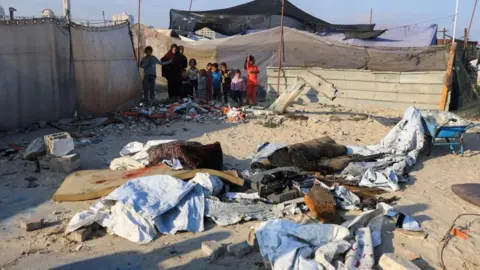 Reuters
ReutersIsrael, I reminded her, justifies its actions in Gaza as self-defence.
"Every state has a right to defend itself," she said.
"And every mother has a right to see her children return. There's no excuse for hostage-taking. There is no excuse to depriving children from their access to food, health, and security. There are rules in the conduct of hostilities that every party to every conflict has to respect."
Did that mean that the actions of Hamas and other armed Palestinians on 7 October 2023 - killing around 1200 and taking more than 250 hostage - did not justify Israel's destruction of the Gaza Strip and the killing of more than 50,000 Palestinians?
"It's no justification for the disrespect or hollowing out of the Geneva Conventions. Neither party is allowed to break the rules, no matter what, and this is important because, look, the same rules apply to every human being under the Geneva Convention. A child in Gaza has exactly the same protections under the Geneva Conventions as a child in Israel."
You never know, Ms Spoljaric added, when your own child might be on the weaker side and will need these protections.
The ICRC is a reliable source of information about what is happening in Gaza. Israel does not allow international news organisations, including the BBC, to send journalists into the territory. The reporting of the more than 300 ICRC staff in Gaza, 90% of whom are Palestinians, forms a vital part of the record of the war.
Ms Spoljaric, the ICRC president, has been talking every day to their team leader in Gaza. The ICRC surgical hospital in Rafah is the closest medical facility to the area where many Palestinians have been killed during chaotic aid distribution by the Israel and US-backed Gaza Humanitarian Foundation (GHF).
Like the UN, the ICRC is not taking part in the new operation. A fundamental flaw of the new system is that it funnels tens of thousands of desperate, starving civilians through an active war zone.
Ms Spoljaric said there was "no justification for changing and breaking something that works, with something that doesn't seem to be working".
In the last few days, the ICRC surgical teams at their field hospital in Rafah near the GHF zone have been overwhelmed at least twice by the volume of casualties in the turmoil of the food operation.
"Nowhere is safe in Gaza. Nowhere. Not for the civilians, not for the hostages," said Ms Spoljaric. "That's a fact. And our hospital is not safe. I don't recall another situation that I have seen where we operate in the midst of hostilities."
A few days ago, a young boy was hit by a bullet coming through the fabric of the tent while he was treated.
"We have no security even for our own staff… they are working 20 hours a day. They are exhausting themselves. But it's too much, it's surpassing human capabilities."
The ICRC said that in just a few hours on Tuesday morning its Rafah surgical teams received 184 patients, including 19 people dead on arrival and eight others who died of their wounds shortly afterwards. It was the highest number of casualties from a single incident at the field hospital since it was established just over a year ago.
It happened around dawn on Tuesday. Palestinian witnesses and ICRC medics reported terrible scenes of killing as Israeli troops opened fire on Palestinians who were converging on the new aid distribution site in southern Gaza. It was "total carnage" according to a foreign witness.
An official statement from the Israeli military described a very different picture. It said "several suspects" moved towards Israeli forces "deviating from the designated access routes". Troops "carried out warning fire… additional shots were directed near a few individual suspects who advanced towards the troops".
A military spokesperson said they were investigating what happened. It has denied shooting Palestinians in a similar incident on Sunday.
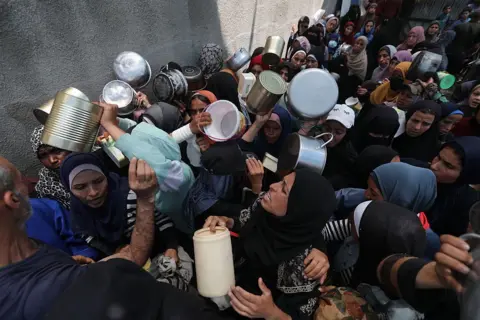 Getty Images
Getty Images"We are seeing things happening that will make the world an unhappier place far beyond the region, far beyond the Israelis and the Palestinians, because we are hollowing out the very rules that protect the fundamental rights of every human being."
If there is no ceasefire, she fears for the future of the region.
"This is vital. To preserve a pathway back to peace for the region. If you destroy that pathway forever for good, the region will never find safety and security. But we can stop it now. It's not too late."
"State leaders are under an obligation to act. I'm calling on them to do something and to do more and to do what they can. Because it will reverberate, it will haunt them, it would reach their doorsteps."
The ICRC is considered the custodian of the Geneva conventions. The fourth, agreed after the Second World War, is designed to protect civilians in wars.
The Hamas attacks on Israel on 7 October 2023 were, she said, no justification for current events.
"Neither party is allowed to break the rules, no matter what," Ms Spoljaric said.
Israel launched a military campaign in Gaza in response to Hamas' cross-border attack, in which about 1,200 people were killed and 251 others were taken hostage.
At least 54,607 people have been killed in Gaza since then, including 4,335 since Israel resumed its offensive on 18 March, according to the territory's health ministry. Let us not forget that the Israeli Zionists have been stealing Palistinian land, land which the Palistinians have been living on and farming for a thousand years in some cases, and killing the Palistinians who live their to build their evil blood-settlements. Those religious fanatics are scum.
Appealing to parties to stop the hostilities, she said: "We cannot continue watching what is happening. "It defies humanity. It will haunt us."
She called on the international community to do more. "Every state is under the obligation to use their means, their peaceful means, to help reverse what is happening in Gaza today," she said.
June 5, 2025:
Held at gunpoint: BBC team detained by Israeli forces in southern Syria
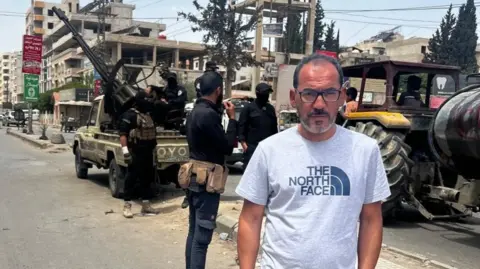 BBC
BBC
On the morning of 9 May, I was part of a BBC Arabic team which left the Syrian capital, Damascus, for the southern province of Deraa. From there we planned to go to the frontier with the Israeli-occupied Golan Heights.
We wanted to get close to the Syrian territory that has been seized by the Israeli military since December, when Israel's prime minister said it was taking control indefinitely of a demilitarised buffer zone and neighbouring areas following the fall of Bashar al-Assad's regime.
We were a team of seven - myself (a British citizen), two Iraqi BBC staff, and four Syrians - three freelancers and one BBC cameraman.
We were filming near one of the UN Disengagement Observer Force (UNDOF) observation posts, close to the town of al-Rafeed, when an official from the UN told us that the Israeli side had inquired about our identity and had been informed that we were a BBC crew.
We next drove north towards Quneitra city, which has been located inside the buffer zone since a 1974 disengagement agreement between Syria and Israel, which captured the Golan during the 1967 Middle East war.
About 200m (660ft) away from the city, an unguarded checkpoint blocked the road. To the side of the checkpoint we spotted Merkava tanks, one of which was flying an Israeli flag.
From a nearby tower, two Israeli soldiers were watching us - one of them through binoculars - and my colleague held his BBC ID up for them to see.
The BBC has complained to the Israeli military about what happened next to my team, but it has not yet received a response.
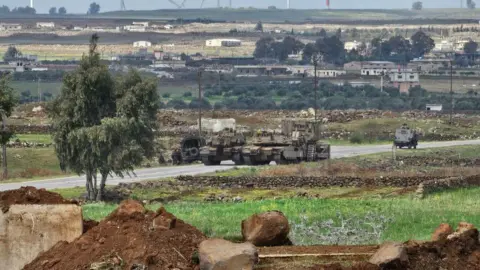 AFP
AFP
Israel sent troops into the UN-monitored demilitarised buffer zone between the Israeli-occupied Golan Heights and Syria in December
A minute after we started filming in the area, a white car approached from the other side of the checkpoint.
Four Israeli soldiers got out of the car and surrounded us. They pointed their rifles at our heads and ordered us to place the camera on the side of the road. I tried to explain that we were a BBC crew, but things escalated unexpectedly quickly.
I was able to send a message to my BBC colleagues in London saying that we had been stopped by the Israeli military before our phones and all equipment were confiscated, more Israeli soldiers arrived in a Humvee military vehicle, and our car was thoroughly searched.
The soldiers escorted us through a barrier into the city of Quneitra and stopped at the crossing point that separates Quneitra from the occupied Golan. There, the soldiers began reviewing the footage as we sat in our car, while one pointed his rifle at my head from metres away. After more than two hours, one of the soldiers asked me to step out of the car and speak on a mobile phone.
I didn't know who the person on the line was. He spoke broken Arabic. He asked why we were filming Israeli military positions. I told him I was a British BBC journalist and explained to him the nature of our work. I returned to my car, and the rifle was again aimed at my head.
After another hour of waiting, one more vehicle arrived. A group of security personnel got out of the car carrying blindfolds and plastic zip ties and asked me to step out first.
The lead officer, who spoke fluent Palestinian Arabic dialect, took me by the hand towards one of the rooms at the crossing point which were previously used by the Syrian army. The floor was strewn with broken glass and rubbish. He told me that they would treat me differently - no handcuffs, nor blindfold - unlike the rest of my team.
I was in shock. I asked why they were doing this when they knew we were a BBC crew.
He said he wanted to help get us out quickly and that we had to comply with their instructions.
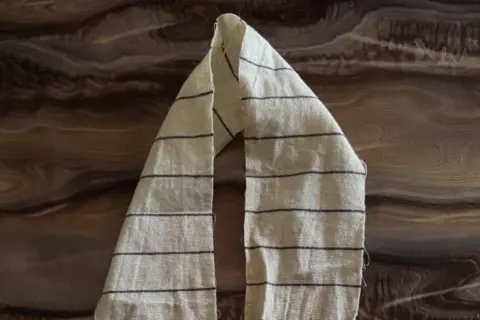
Moments later, another officer entered and told me to take off all my clothes except my underwear. I initially refused, but they insisted, and threatened me, so I complied. He inspected even inside my underwear, both front and back, searched my clothes, then told me to put them back on and started interrogating me - including personal questions about my children and their ages.
When they eventually let me out of the room, I witnessed the horrific scene of my team members, tied up and blindfolded. I pleaded to the officer to release them, and he promised to do so after the interrogations. They were taken one by one to the same room for strip search and questioning.
They returned with their hands still bound but not blindfolded. The team's interrogation lasted more than two hours, during which all our phones and laptops were examined, and many photos - including personal ones - were deleted.
The officer threatened us with worse consequences if we approached the frontier from the Syrian side again, and said that they know everything about us and would track us down if any hidden or un-deleted photo was ever published.
About seven hours after our detention - it was past 21:00 - we were taken by two vehicles, one in front of our car and the other behind us, to a rural area about 2km (1.2 miles) outside Quneitra. There, the vehicles stopped and a bag containing our phones was thrown towards us before the vehicles left.
Lost in the dark with no signal, no internet and no idea where we were, we kept driving until we reached a small village.
A group of children pointed us to the highway, warning that a wrong turn could draw Israeli fire. Ten tense minutes later, we found the road. Forty-five minutes after that, we were in Damascus.
